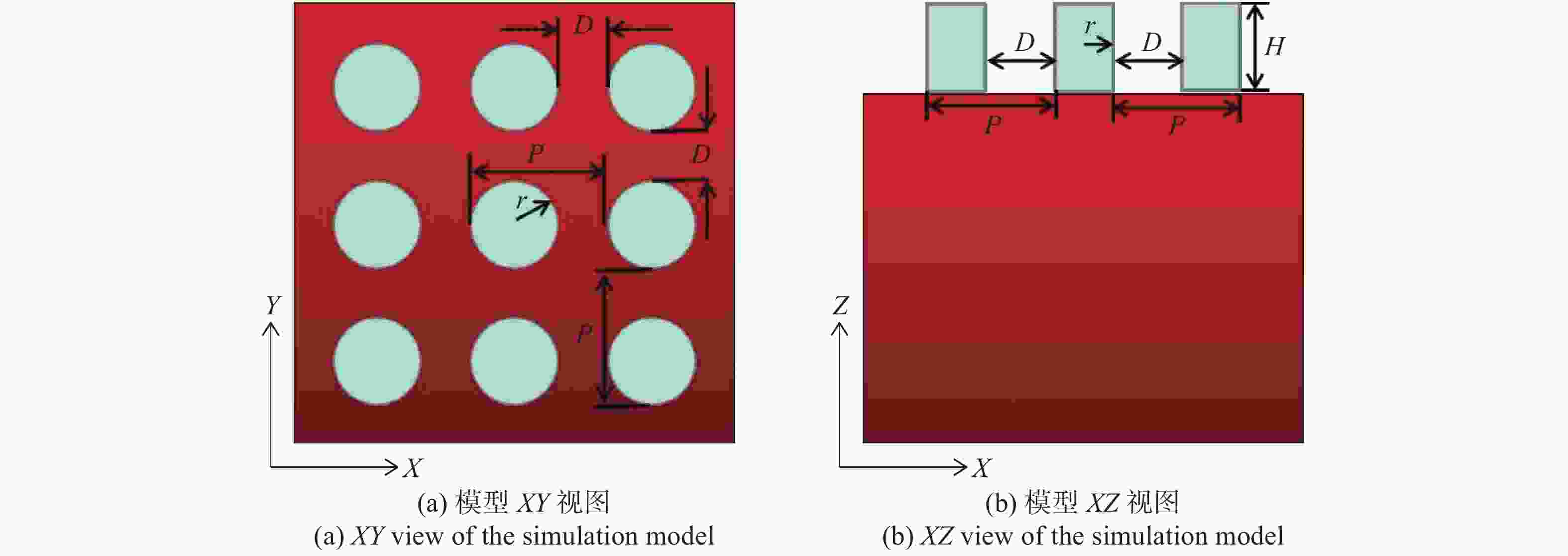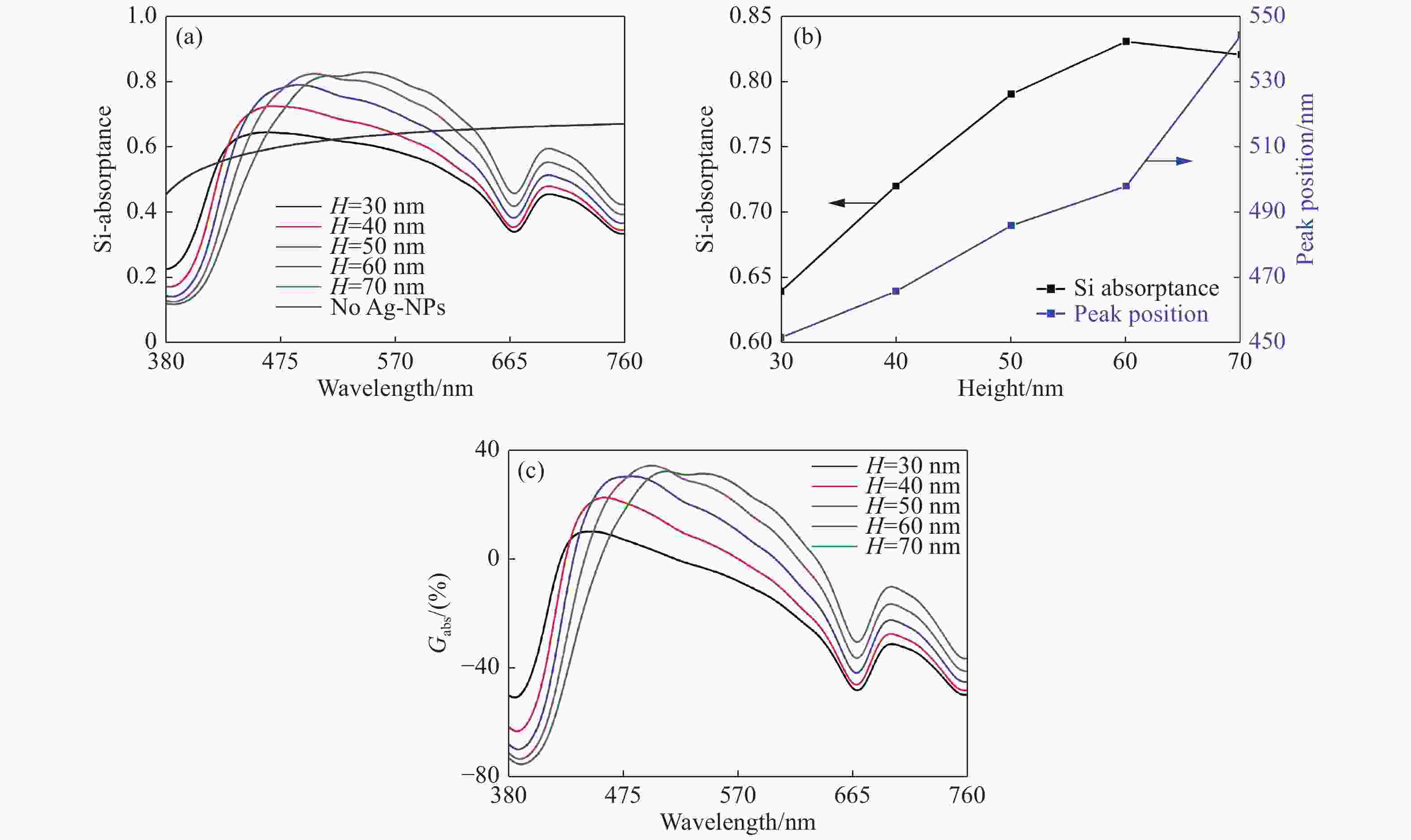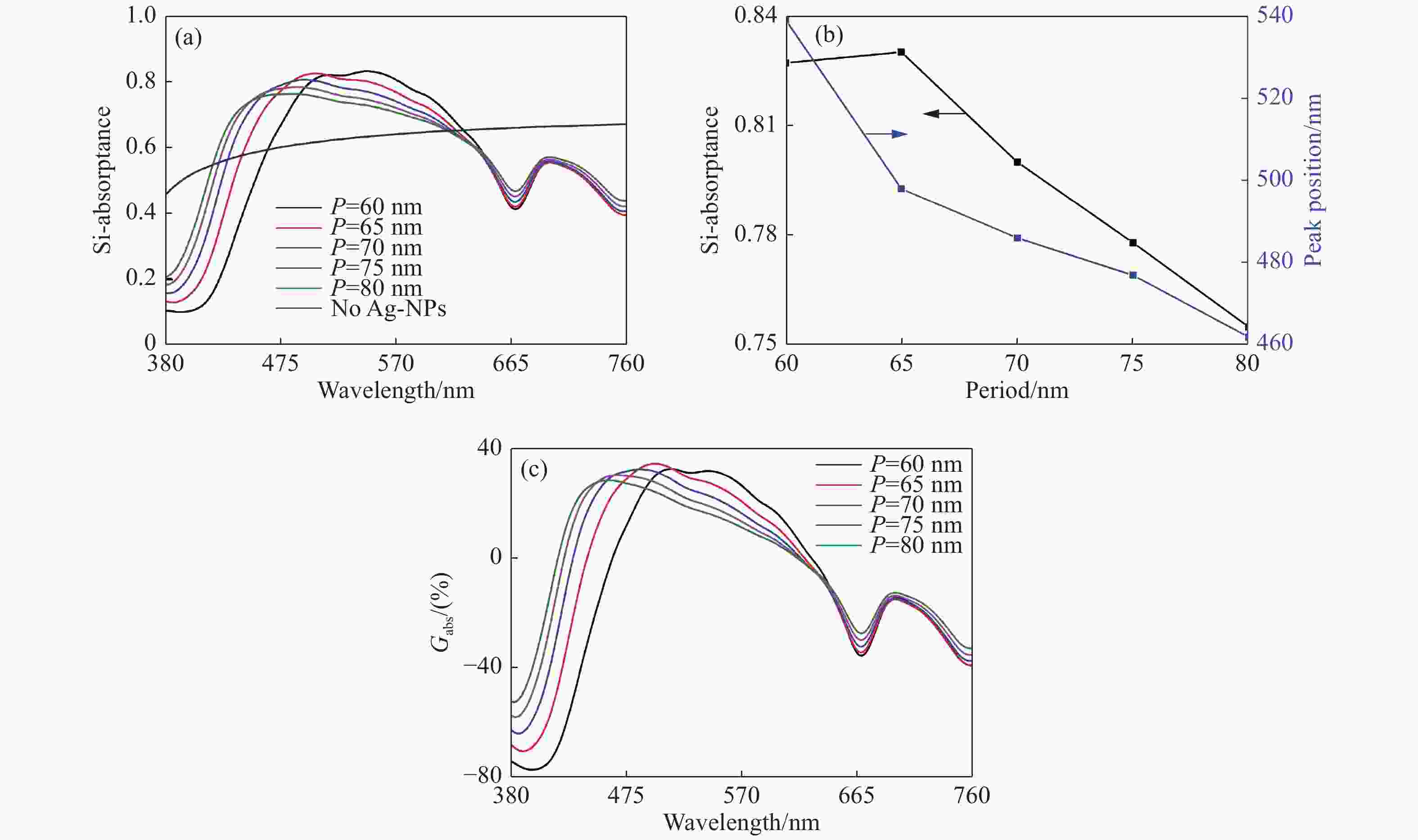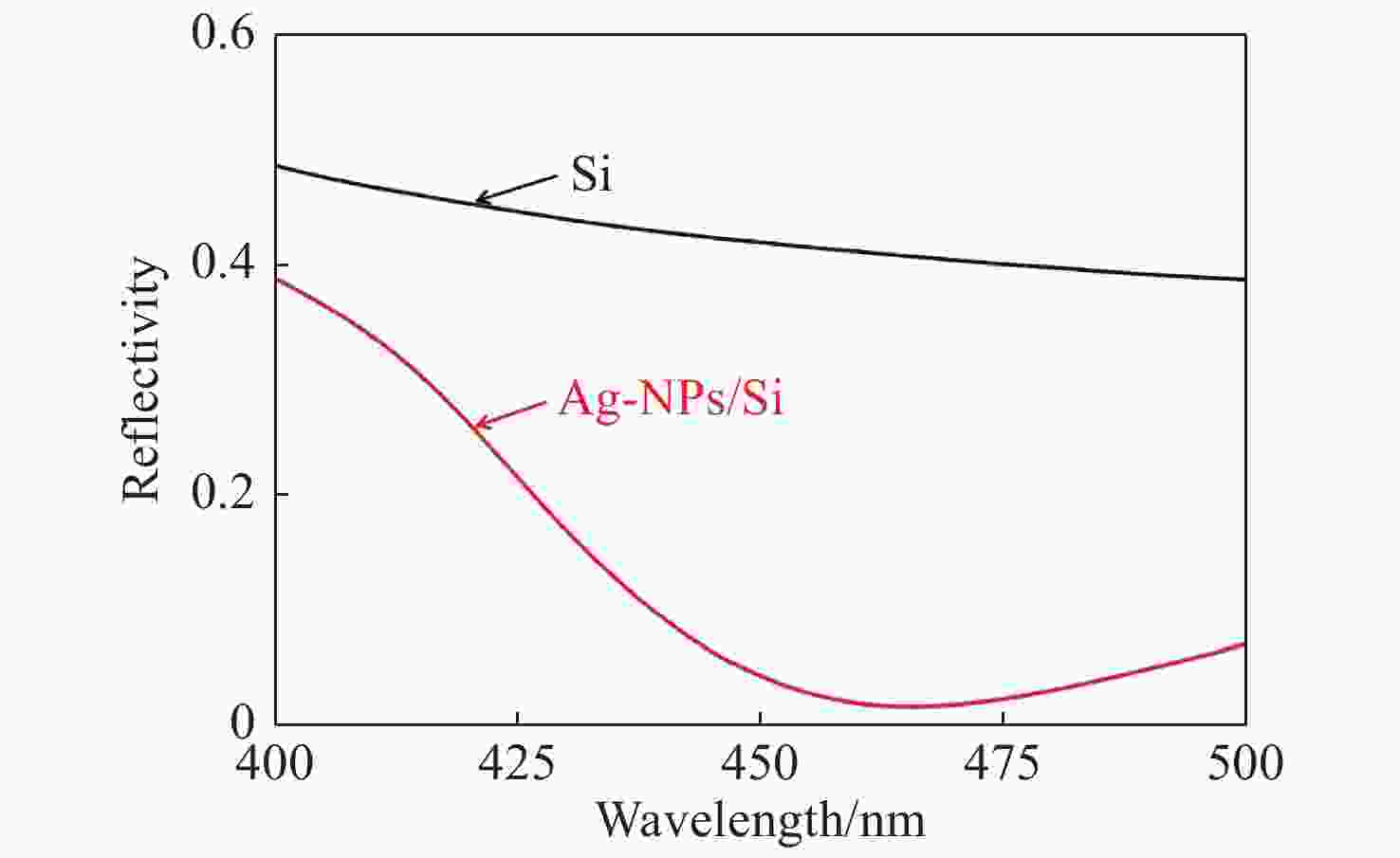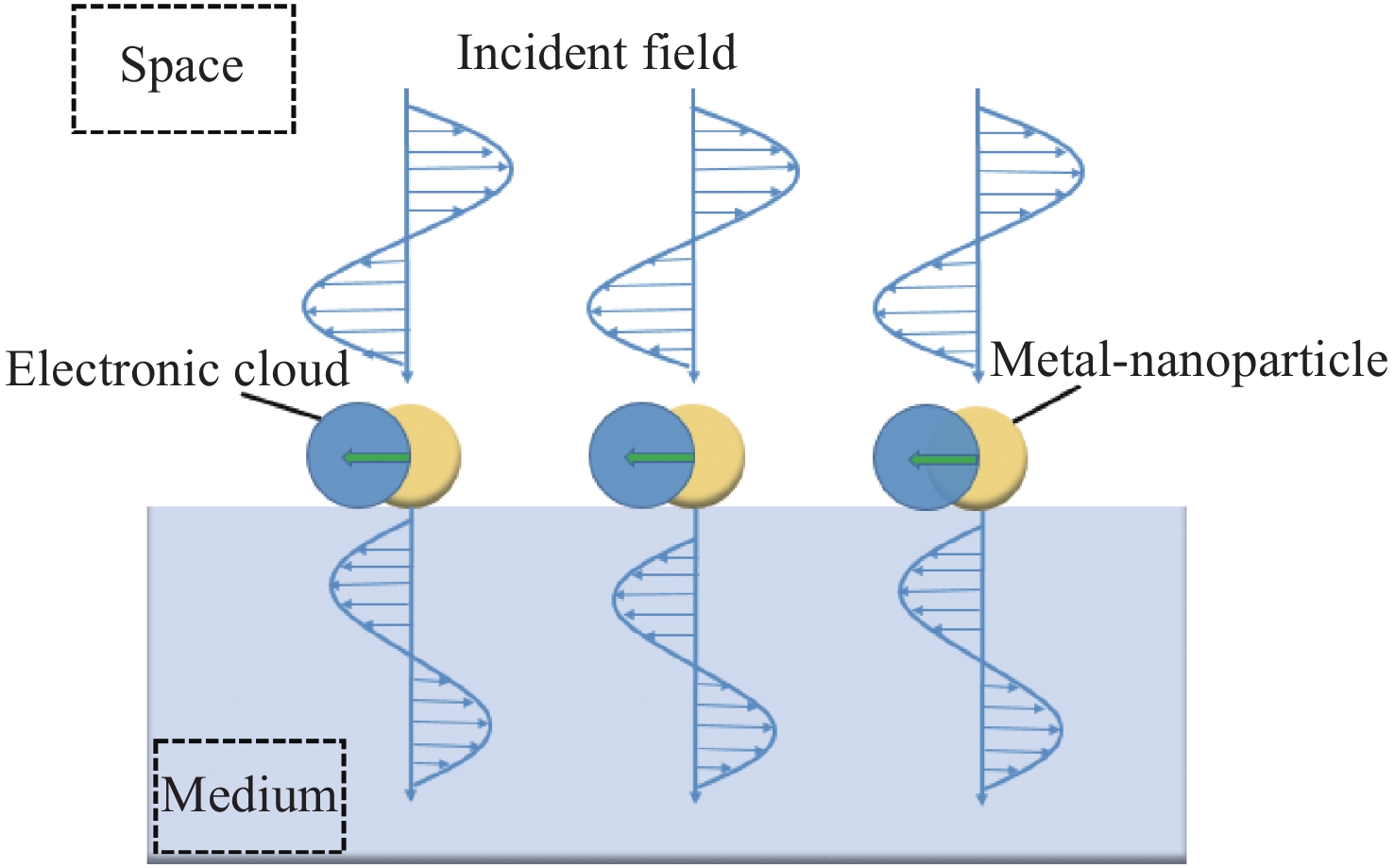Absorption enhancement of silicon via localized surface plasmons resonance in blue band
doi: 10.37188/CO.2020-0056
-
摘要: 为增强硅的蓝光吸收,在硅表面设计银纳米颗粒阵列,基于局域表面等离激元共振效应对增强的硅蓝光吸收特性进行了分析研究。采用有限时域差分法计算银纳米颗粒阵列/硅复合结构中硅的蓝光吸收特性。结果表明:金属颗粒的消光能力与其几何参数有关,改变银纳米颗粒阵列的半径r、高度H与周期P可调控局域表面等离激元共振强度与共振频率,当银纳米颗粒阵列参数设定为:r = 18.5 nm、H = 45 nm、P = 49 nm时,在共振吸收波长为465 nm的情况下,硅的蓝光吸收率由59%增加至94%,光吸收增益为0.57,光生载流子数目增益为0.53,分析认为是局域表面等离激元共振增强硅在蓝光波段的光吸收导致上述增益现象。本文的研究结果对了解局域表面等离激元效应,改善硅的蓝光吸收特性,设计和制备高蓝光响应度硅基可见光光电探测器具有重要的参考价值。Abstract: To enhance the blue light absorption of silicon, an array of silver nanoparticles(Ag-NPs) was designed so that they create Localized Surface Plasmon Resonance(LSPR) near the surface of silicon(Si). The properties of the enhanced optical absorption of silicon in the blue band were then observed and researched. The blue-light absorption characteristic of silicon in the Ag-NPs/Silicon composite structure were calculated using the Finite-Difference-Time-Domain (FDTD) method. The results indicated that the metallic nanoparticles' extinction capability was related to its geometric parameters and the resonance intensity and peak wavelength can be tuned according to different geometric parameters of Ag-NPs including radius, height and period. At a resonance peak wavelength of 465 nm, the optical absorption of Si in the composite structure (Ag-NPs/Si) rises from 59% to 94% with an array of radius r = 18.5 nm, a height H = 45.0 nm and a period P = 49.0 nm. It concluded that the light absorption gain was 0.57 and photogenerated carriers had a gain factor of 0.53 due to the enhanced light absorption of Si via LSPR in blue band. The results provide a significant reference for the enhancement of the blue-light absorption properties in silicon based on the LSPR effect and the design of a silicon-photodetector with a visible wide spectral resoponse.
-
Key words:
- localized surface plasmon /
- silicon /
- blue light /
- absorptivity /
- FDTD method
-
图 3 Ag-NPs几何参数对硅的光学行为的影响。(a)半径r对硅在蓝光波段的吸收影响;(b)光吸收率与共振波长随半径r的变化;(c)半径r对硅在蓝光波段的吸收增益影响
Figure 3. Influence of geometric parameters of Ag-NPs on the optical properties of silicon. (a) Absorptance versus radius r in blue band; (b) absorptance and resonant wavelength versus radius r; (c) absorption gain versus radius r in blue band
图 4 Ag-NPs几何参数对硅的光学性质的影响。(a)高度H对硅在蓝光波段的吸收影响;(b)光吸收率与共振波长随高度H的变化;(c)高度H对硅在蓝光波段的吸收增益影响
Figure 4. Influence of geometric parameters of Ag-NPs on the optical properties of silicon. (a) Absorptance versus height H in blue band; (b) absorptance and resonant wavelength versus height H; (c) absorption gain versus height H in blue band
图 5 Ag-NPs几何参数对硅的光学性质影响。(a)周期P对硅在蓝光波段的吸收影响;(b)光吸收率与共振波长随周期P的变化;(c)周期P对硅在蓝光波段的吸收增益影响
Figure 5. Influence of geometric parameters of Ag-NPs on the optical properties of silicon. (a) absorptance versus period P in blue band; (b) absorptance and resonant wavelength versus period P; (c) absorption gain versus period P in blue band
-
[1] QIN P, REN Y, LIU L W, et al. Development of plasmon-resonance of metal nanoparticles enhanced harmonic generation in nonlinear medium[J]. Chinese Optics, 2016, 9(2): 213-225. (in Chinese) doi: 10.3788/co.20160902.0213 [2] LEI J G, LIU T H, LIN J Q, et al. New applications of surface plasmon polaritons[J]. Chinese Optics, 2010, 3(5): 432-439. (in Chinese) doi: 10.3969/j.issn.2095-1531.2010.05.003 [3] MA G H, ZHANG J B, ZHANG H, et al.. Resonant mode of Fabry-Perot microcavity regulated by metal surface plasmons[J]. Chinese Optics, 2019, 12(3): 649-662. [4] XIANG CH P, YUAN ZH SH, LIU J, et al. Surface plasmon polaritons and F-P resonance coupled modes balance the generation rate of charge carriers of Perovskite solar cells[J]. Chinese Journal of Luminescence, 2018, 39(12): 1749-1756. (in Chinese) doi: 10.3788/fgxb20183912.1749 [5] XU H, YAN L, LI L, et al. Influence of localized surface Plasmons on the photoluminescence efficiency of InGaN/GaN multiple quantum wells[J]. Chinese Journal of Luminescence, 2017, 38(3): 324-330. (in Chinese) doi: 10.3788/fgxb20173803.0324 [6] QIAO Q, SHAN CH X, LIU J Y, et al. Localized surface plasmon resonance enhanced electroluminescence from ZnO-based light-emitting diodes via optimizing the density of sliver nanoparticles[J]. Chinese Journal of Luminescence, 2015, 36(12): 1363-1369. (in Chinese) doi: 10.3788/fgxb20153612.1363 [7] BUTUN S, CINEL N A, OZBAY R. Nanoantenna coupled UV subwavelength photodetectors based on GaN[J]. Optics Express, 2012, 20(3): 2649-2656. doi: 10.1364/OE.20.002649 [8] QIAO J, XIE SH, MAO L H, et al. Optimum design of silicon-based metal-semiconductor-metal photodetector with subwavelength metal grating[J]. Chinese Journal of Luminescence, 2018, 39(3): 363-368. (in Chinese) doi: 10.3788/fgxb20183903.0363 [9] SHAO W J. Design and numerical simulation of optical filter and metamaterial perfect absorber based on surface plasmon polaritons[D]. Hefei: University of Science and Technology of China, 2014. (in Chinese). [10] WOKAUN A, GORDON J P, LIAO P F. Radiation damping in surface-enhanced raman scattering[J]. Physical Review Letters, 1982, 48(14): 957-960. doi: 10.1103/PhysRevLett.48.957 [11] CLAVERO C. Plasmon-induced hot-electron generation at nanoparticle/metal-oxide interfaces for photovoltaic and photocatalytic devices[J]. Nature Photonics, 2014, 8(2): 95-103. doi: 10.1038/nphoton.2013.238 [12] KNIGHT M W, SOBHANI H, NORDLANDER P, et al. Photodetection with active optical antennas[J]. Science, 2011, 332(6030): 702-704. doi: 10.1126/science.1203056 [13] LI D B, SUN X J, SONG H, et al. Realization of a high-performance GaN UV detector by nanoplasmonic enhancement[J]. Advanced Materials, 2012, 24(6): 845-849. doi: 10.1002/adma.201102585 [14] SOBHANI A, KNIGHT M W, WANG Y M, et al. Narrowband photodetection in the near-infrared with a plasmon-induced hot electron device[J]. Nature Communications, 2013, 4(1): 1643. doi: 10.1038/ncomms2642 [15] BAO G H, LI D B, SUN X J, et al. Enhanced spectral response of an AlGaN-based solar-blind ultraviolet photodetector with Al nanoparticles[J]. Optics Express, 2014, 22(20): 24286-24293. doi: 10.1364/OE.22.024286 [16] QU D, LIU F, YU J F, et al. Plasmonic core-shell gold nanoparticle enhanced optical absorption in photovoltaic devices[J]. Applied Physics Letters, 2011, 98(11): 113119. doi: 10.1063/1.3559225 [17] LIU Y, CAI X P, LIN L, et al. Research on the fusion technology of LED visible optical communication network with ethernet[J]. Optical Communication Technology, 2019, 43(1): 1-4. (in Chinese) [18] CHI N, WANG CH F, LI W P, et al. Research progress of underwater visible light communication technology based on blue/green LED[J]. Journal of Fudan University (Natural Science) , 2019, 58(5): 537-548. (in Chinese) [19] ZHAO T F, MA ZH, LI X SH, et al. Research on line-of-sight channel model of short-range LED optical communication[J]. Acta Photonica Sinica, 2020, 49(1): 106001. (in Chinese) doi: 10.3788/gzxb20204901.0106001 [20] TAFLOVE A, HAGNESS S C. Computational Electrodynamics: The Finite-Difference Time-Domain Method[M]. 2nd ed. Boston: Artech House, 2000. [21] ZHU X P, ZHANG SH, SHI H M, et al. Research progress of coupling theory of metal surface plasmon[J]. Acta Physica Sinica, 2019, 68(24): 247301. (in Chinese) doi: 10.7498/aps.68.20191369 [22] CONG CH. Localized surface plasmon resonance properties of noble metal nanoparticles[D]. Nanjing: Nanjing University, 2011. (in Chinese). [23] BAI Y C, GAO C B, YIN Y D. Fully alloyed Ag/Au nanorods with tunable surface plasmon resonance and high chemical stability[J]. Nanoscale, 2017, 9(39): 14875-14880. doi: 10.1039/C7NR06002E [24] WEST P R, ISHII S, NAIK G V, et al. Searching for better plasmonic materials[J]. Laser &Photonics Reviews, 2010, 4(6): 795-808. [25] SCHINKE C, PEEST P C, SCHMIDT J, et al. Uncertainty analysis for the coefficient of band-to-band absorption of crystalline silicon[J]. AIP Advances, 2015, 5(6): 067168. doi: 10.1063/1.4923379 [26] PALIK E D. Handbook of Optical Constants of Solids[M]. New York: Academic Press, 1998. [27] WANG SH J, SU D, ZHANG T. Research progress of surface plasmons mediated photothermal effects[J]. Acta Physica Sinica, 2019, 68(14): 144401. (in Chinese) doi: 10.7498/aps.68.20190476 [28] MIE G J A P. Articles on the optical characteristics of turbid tubes, especially colloidal metal solutions[J]. Annals of Physics, 1908, 25(3): 377-445. [29] KELLY K L, CORONADO E, ZHAO L L, et al. The optical properties of metal nanoparticles: the influence of size, shape, and dielectric environment[J]. The Journal of Physical Chemistry B, 2003, 107(3): 668-677. doi: 10.1021/jp026731y [30] PIETROBON B, MCEACHRAN M, KITAEV V. Synthesis of size-controlled faceted pentagonal silver nanorods with tunable plasmonic properties and self-assembly of these nanorods[J]. ACS Nano, 2009, 3(1): 21-26. doi: 10.1021/nn800591y [31] LINK S, EL-SAYED M A. spectral properties and relaxation dynamics of surface plasmon electronic oscillations in gold and silver nanodots and nanorods[J]. The Journal of Physical Chemistry B, 1999, 103(40): 8410-8426. doi: 10.1021/jp9917648 [32] KHLEBTSOV B, KHANADEEV V, KHLEBTSOV N. Tunable depolarized light scattering from gold and gold/silver nanorods[J]. Physical Chemistry Chemical Physics, 2010, 12(13): 3210-3218. doi: 10.1039/b925102b [33] MAILLARD M, GIORGIO S, PILENI M P. Tuning the size of silver nanodisks with similar aspect ratios: synthesis and optical properties[J]. The Journal of Physical Chemistry B, 2003, 107(11): 2466-2470. doi: 10.1021/jp022357q [34] GARCIA M A. Surface plasmons in metallic nanoparticles: fundamentals and applications[J]. Journal of Physics D:Applied Physics, 2011, 44(28): 283001. doi: 10.1088/0022-3727/44/28/283001 [35] LAI SH M, HUANG ZH W, WANG Y J, et al. Simulation and analysis of local surface plasmon resonance of Ag nanostructures[J]. Laser &Optoelectronics Progress, 2018, 55(12): 122601. (in Chinese) [36] LINK S, El-SAYED M A. Size and temperature dependence of the plasmon absorption of colloidal gold nanoparticles[J]. The Journal of Physical Chemistry B, 1999, 103(21): 4212-4217. doi: 10.1021/jp984796o [37] LINK S, MOHAMED M B, EL-SAYED M A. Simulation of the optical absorption spectra of gold nanorods as a function of their aspect ratio and the effect of the medium dielectric constant[J]. The Journal of Physical Chemistry B, 1999, 103(16): 3073-3077. doi: 10.1021/jp990183f [38] MARKEL V A. Coupled-dipole approach to scattering of light from a one-dimensional periodic dipole structure[J]. Journal of Modern Optics, 1993, 40(11): 2281-2291. doi: 10.1080/09500349314552291 [39] ZOU SH L, JANEL N, SCHATZ G C. Silver nanoparticle array structures that produce remarkably narrow plasmon lineshapes[J]. The Journal of Chemical Physics, 2004, 120(23): 10871-10875. doi: 10.1063/1.1760740 [40] ROCKSTUHL C, FAHR S, LEDERER F. Absorption enhancement in solar cells by localized plasmon polaritons[J]. Journal of Applied Physics, 2008, 104(12): 123102. doi: 10.1063/1.3037239 [41] GÄRTNER W W. Depletion-layer Photoeffects in semiconductors[J]. Physical Review, 1959, 116(1): 84-87. doi: 10.1103/PhysRev.116.84 -






 下载:
下载:
